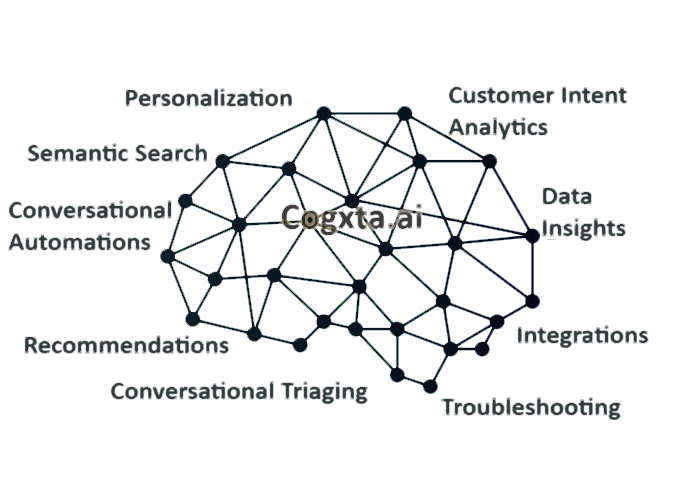Customer profiling, Ad targeting, Predictive lead scoring.
Product/service recommendations, Competitor analysis, Market sentiment tracking.
Predictive buying behavior, Personalized offers, Pricing optimization models.
Customer support automation, Real-time assistance, Issue resolution prediction.
Churn prediction, Retargeting campaigns, Loyalty program insights.
COGXTA is a Customer Sciences company focused on Insight AI to accelerate businesses struggle with Inefficient Decision-Making and Manual Processes.
We specializes in solving customer churn across industries by leveraging advanced machine learning and causal inference. By identifying key churn indicators and optimizing customer retention strategies, we empower businesses to reduce attrition, increase customer loyalty, and boost long-term profitability, delivering tailored solutions that adapt to diverse market needs.

50+ Complex business usecases solved using insight AI

11 Years of AI expertise with highly skilled professionals

Average of 14% KPI improvements and efficiency delivered

98% Customer satisfaction rate with on-time deliverables
Integrate and scale to accommodate large datasets and multiple sources, Our causal models ensure that the insights are actionable and lead to direct improvements in ROI
We understand that each business and respective requirements is unique, and we customize our AI training to meet your specific requirements.
We are a research and technology company building solutions with Insight AI framework and providing seamless integration with your products
Our team consists of highly skilled professionals with extensive experience in AI and ML, delivering deep consulting in AI

By understanding which marketing activities or campaigns truly drive new customers through causal impact analysis, businesses can allocate their budgets more effectively and focus on high-impact channels.

By using data-driven insights to personalize customer outreach and prevent churn, the platform helps businesses retain high-value customers and reduce the cost of acquisition over time.
Agentic workflow for Insight AI automates industrial tasks by intelligently managing complex operations, improving efficiency, decision-making, and task execution with minimal human intervention, ensuring seamless process optimization and scalability.

 Our Insight AI collects and processes user interaction data, such as browsing history, click patterns, and purchase behavior.
Our Insight AI collects and processes user interaction data, such as browsing history, click patterns, and purchase behavior.
 Using sophisticated machine learning models, Insight AI generates recommendations based on user profiles and item features, constantly adapting to changing preferences.
Using sophisticated machine learning models, Insight AI generates recommendations based on user profiles and item features, constantly adapting to changing preferences.
 Recommendations are seamlessly integrated into your website or application, offering users a highly personalized experience.
Recommendations are seamlessly integrated into your website or application, offering users a highly personalized experience.
 Insight AI continuously learns and improves from user feedback, ensuring that recommendations become more precise over time.
Insight AI continuously learns and improves from user feedback, ensuring that recommendations become more precise over time.





The team delivered a high-quality solution on time and exceeded our expectations. Communication was seamless, and they truly understood our vision."
We needed a complex insights, and they handled every challenge efficiently. Their expertise in AI development and Insights generation is top-notch."
The team not only built a fantastic AI framework but also provided valuable insights to improve consumer metrics. Highly recommended!"
